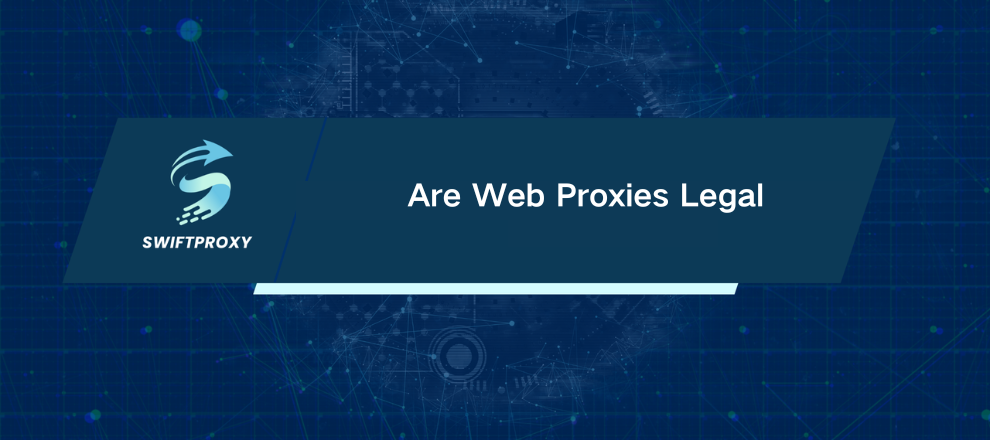Are Web Proxies Legal
The internet has changed. Ads track you. Regional blocks restrict your favorite shows. And every click leaves a digital footprint. Enter web proxies. Chances are, you’ve heard of them—or even used one. But in 2025, one question keeps surfacing: are proxies actually legal? Let’s cut through the noise. No tech jargon. No guesswork. Just clear answers. By the end of this guide, you’ll understand what proxies are, when their use is perfectly legal, and when it could land you in serious trouble. We’ll also highlight the risks in regions with stricter cyber laws and show how to use proxies safely for work, research, and privacy.

What Is a Web Proxy Really
Think of a proxy like a middleman for your internet traffic. Imagine mailing a letter to a friend through a trusted intermediary who keeps your address hidden. Online, that's what a proxy does.
A web proxy sits between your device and the websites you visit. Your requests go to the proxy first, then the internet. The website sees the proxy's IP address—not yours.
Why does this matter? Because hiding your IP opens doors: bypassing regional blocks, comparing prices across countries, or scraping websites for market research. Businesses love proxies for testing websites globally, managing multiple accounts, or running analytics. Individuals use them for privacy and smoother browsing.
Not all proxies are equal. Residential proxies mimic real users and locations, while datacenter proxies are faster but easier to detect. Choosing the right one depends on your needs.
However, proxies protect anonymity, not legality. Misuse can trigger serious consequences.
Are Proxies legal
Using a proxy is legal in most countries—but the context matters.
Legitimate uses include:
Accessing regionally restricted streaming content
Enhancing privacy on public Wi-Fi
Conducting business research across regions
Illegal or unethical uses include:
Hacking or accessing someone else's accounts
Evading bans to harass or deceive
Unauthorized scraping or fraud
A proxy itself isn't a crime—it's a tool. The legality depends entirely on what you're doing with it.
Legal Dangers of Using Proxies
Even if proxies aren't illegal by default, misuse can create headaches:
Violating Terms of Service: Netflix, gaming platforms, and e-commerce sites often ban proxy use. Bypass these rules, and your account could be suspended—or worse.
Bypassing regional restrictions: Streaming shows or events you shouldn't access can breach copyright laws.
Censored or restricted content: In countries with strict internet controls, using a proxy to bypass blocks can carry fines or legal penalties.
Automation abuse: Sneaker bots, spam, or fake accounts via proxies may violate platform rules or laws.
Fraud and identity theft: Using a proxy for phishing, fraud, or impersonation is illegal almost everywhere.
The Legality of Proxies Around the World
USA and Canada: Generally legal. Businesses use them for marketing, security, and research. Illegal if used for fraud or rule-breaking.
UK and EU: Legal for personal or business use, but GDPR matters. Tracking people without consent is prohibited.
Asia:
China: Heavy restrictions; unauthorized proxies can mean fines.
India: Mostly legal, but illegal activity remains punishable.
Japan: Legal, but illegal content access isn't tolerated.
Middle East:
UAE and Saudi Arabia: Restricted. Bypassing government blocks can trigger fines.
Russia and CIS: Mixed. Russia blocks many proxy sites; misuse can be flagged. Other CIS nations vary.
Africa and South America: Generally less strict, but local laws evolve. Legal misuse still carries penalties.
Proxies are mostly legal—but know your local laws before using one.
When Using a Proxy Becomes Illegal
Proxies become illegal when used to commit crimes:
Fraud: Accessing someone else's bank account or stealing information.
Copyright infringement: Streaming or downloading pirated content.
DDoS attacks or hacking: Hiding behind a proxy to attack websites.
Ticket scalping and botting: Using proxies to unfairly buy and resell tickets.
Proxies are neutral. It's the intent and activity behind them that determines legality.
How to Use Proxies Safely and Legally
Follow these best practices:
Respect Terms of Service: Don't violate platform rules.
Avoid illegal sites: If it's illegal without a proxy, it's illegal with one.
Stick to legitimate goals: Privacy, research, regional access, or business operations.
Never hide criminal activity: Law enforcement can still trace you.
Check local laws: Regulations differ by country.
Choose reputable providers: Free proxies can be insecure. Trusted services like Swiftproxy offer reliability and safety.
Select the right type of proxy: Residential or datacenter, depending on your task.
Avoid automation abuse: Bots or scripts can trigger legal or platform penalties.
Follow these rules, and proxies become a powerful tool—without legal risk.
Conclusion
Proxies are legal in most countries—but legality is all about usage. They're a shield for privacy, a tool for work, and a key to accessing restricted content.
Cross the line into fraud, hacking, or copyright infringement, and that shield turns into a liability.
Be responsible. Stay informed. Use trusted providers. Respect local laws. And with the right approach, proxies unlock a safer, faster, and more private internet experience—legally.

















































